Ridgefield International Film Festival 2020: Psych Night Shorts
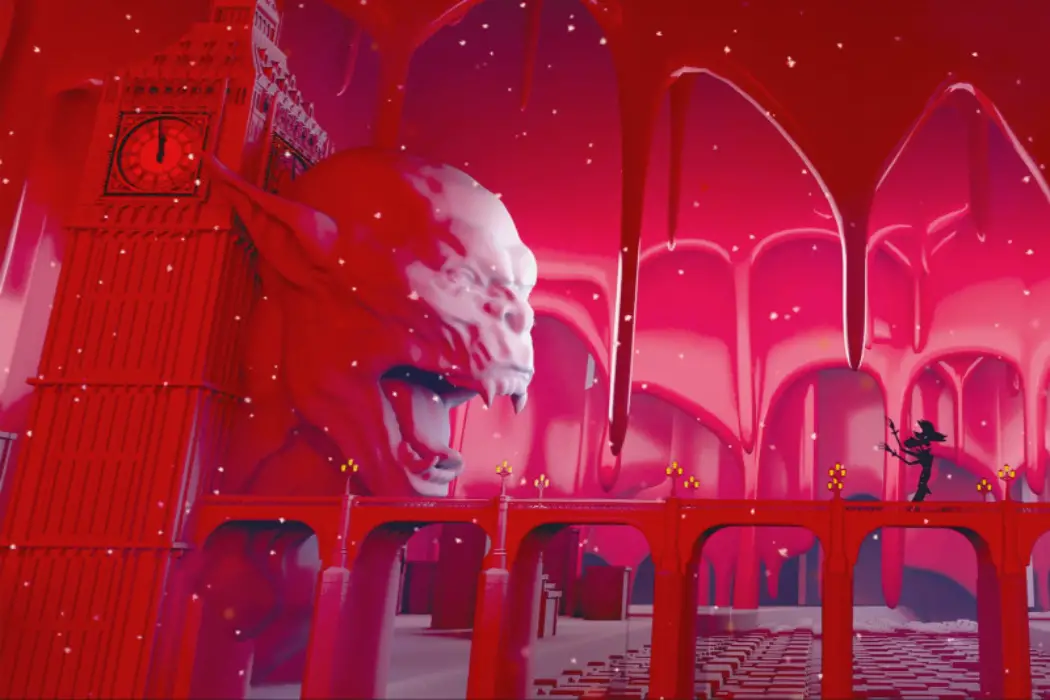
Stephanie Archer is 39 year old film fanatic living in…
It has been a while since I have immersed myself in a compelling and tantalizing collection of shorts and what a way to return. This year’s Ridgefield International Film Festival has gone virtual, embracing the unprecedented times the pandemic has created while also maintaining the widely diverse content they have boasted since the festival’s induction. And in keeping with traditions, Psych Night returns bringing horrors and frights through the short film medium – many of which you will find yourself craving to watch again and again.
Choker (Orson Cornick)
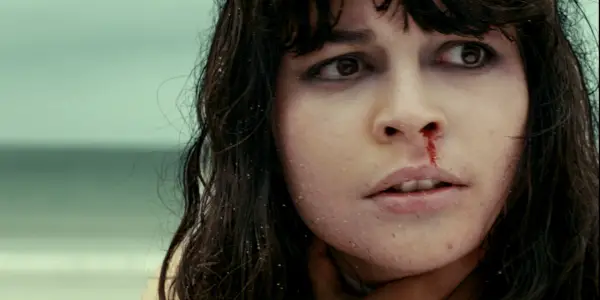
Choker, from director Orson Cornick, is a quick short, its pace only heightened by the metronome that accompanies each moment. We open to a man, pensively waiting for all while there are intercuts of an empty waterway tunnel. As the tunnel opens to the beach, and the man’s phone rings, a creature falls from the sky forcefully landing on the sand.
As the man races to his Jeep, the heartbeat of the short itself increasing, and urgency setting in, we see a young woman, bloodied flopping about the beach struggling for air. She looks to those around her, who do not see here, engulfed within their personal capsules of enjoyment and consumption. As the young woman struggles to become more desperate and even more futile, the man races to her side, knowing he is too late, yet still desperate to try.
While to on the nose in its message, Choker is an effective short horrifically forcing viewers to see what their forms of consumption and disregard could be doing to both the environment and the animals that inhabit it. There is deep understanding as well that for many who want to help, it may be too late, the damage already done. But what they can do, what we can all do, is try.
1971 (Magnus Häll)
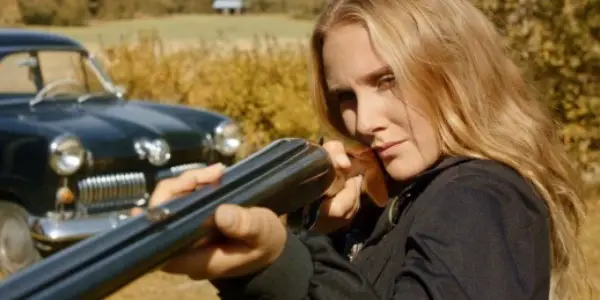
Anyone who has had the chance to see and finish The Haunting of Bly Manor will find themselves once again immersed within dreams and imagination. “It all started with a knock on the door”, these words are more foreboding and more confusing than viewers will first realize at the start of 1917, from director Magnus Häll. As the woman answers the door, exhibiting her strength in self, she is greeted by a man claiming he is looking for help as his car has overheated.
From this moment, viewers will be on edge, searching, and waiting for the “moment” between them to happen – what horrors will emerge from their interactions. And while the short gives you many of these “moments” viewers are left to question what is real and what is not – and whether reality can ever truly be understood. We each have our own reality, on that forms and shapes our decisions – these choices potentially changing the realities of others.
In the end, what does it really matter? Your reality is yours alone, with very little that can be done to alter the reality you hold so dear. We may be presented with different scenarios and different choices, but we will always follow the path that fits our reality and maintains its existence.
The Ooze (Emma Keating)
There is nothing more horrifying for some than the memories of the bullies we have once faced – or even the ones we still face day to day. The Ooze, from director Emma Keating, tackles the idea of bullying. As Michael is walking home, he hears the snickers and the comments from his fellow students behind him. There is a tolerance he is able to maintain until Brody throws an apple at him. Immediately his threshold has been met and he threatens Brody telling him that tomorrow he will be sorry. As Brody laughs off the threat making his way home, Michael retrieves the apple Brody threw and finishes his walk home.
There is frantic excitement as he runs into his garage, a room full of satanic symbols and pagan spells littering the walls and shelves of the darkened room. Reveling a pentagon hidden beneath a throw rug, Michael begins his ritual to summon a demon to defeat his bully – one that is met with “mixed” results. From the center of his pentagon, an oozish blob rises, a voice booming from its core. While not the terrifying beast he had imagined, relief settles in as the ooze promises to defeat his foe – relief that is all too short as the ooze slowly moves across the floor. This is definitely not the demon he had been expecting.
With the ooze unable to make it to the school playground the following day – due to the minuscule progress it has made leaving the house – Michael discovers he must do this on his own. There is the obvious message that no one can fight your battles for you, that you need to stand tall and you need to stand strong against those that harm you. Yet, there is also a message about the way you face your foes. Not with violence, not with hate, but rather with the acceptance of self and the confidence to back it up.
Abe’s Story (Adam H Stewart)
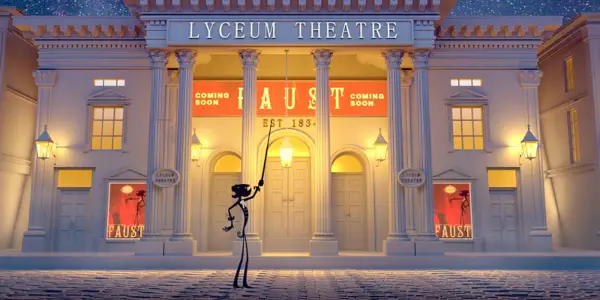
This was by far, the best short of the entire collection. If I could have this one readily available at all times, I would be watching this nonstop. The first animated short of the bunch, Abe’s Story, from director Adam H Stewart, is colorful and precise. The clean edges of its animation match the clear edges of its story. A story which many may know, but most might not recognize right away. This is the story of how Dracula was written.
As the story begins, the animation dazzles audiences as it relays the inspirations and creations of the most recognized portions of the novel from the mind of Bram Stoker as he writes it. From the inspiration behind traveling in coffins to the insane asylum and to the novel’s conclusion, Abe’s Story masterfully captures each moment. Further heightening the success is not just the content of the novel being created, but the outside forces that surround Abe, pushing him and his novel forward.
His stage manager, the world around him, and his brother’s livelihood each have a role and a piece of the puzzle Abe must wield – pieces that would become elements to the most recognizable work in literary history. There is an excitement as you recognize each part of the novel being recreated and formed, though the enjoyment is not lost on those who may not be as familiar with the tale. One of the best of the shorts, and one of the best animated shorts I have seen in some time, this is the one to see this year.
Bakemono ( Jorge Lucas and Sumire Takamatsu)
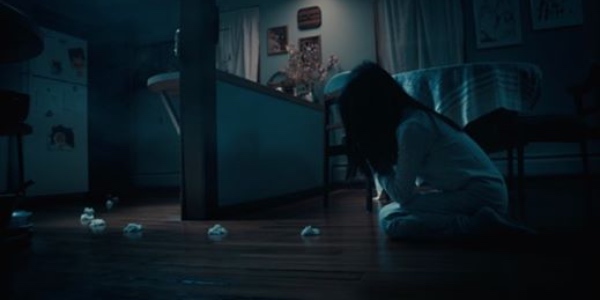
Viewers are introduced to Bakemono, by directors Jorge Lucas and Sumire Takamatsu, through the film’s initial title card. Informing audiences of Setsubun, the day before spring, we immediately become aware fo the tradition of throwing soybeans to ward off unwanted demons while immediately becoming aware that this year, demons will have free reign. The intrigue is to how. Thankfully the short is aware of its time constraints and moves forward quickly, a mother explaining to her daughter and to audiences the different kinds of demons that could come into their home, her primary focus settling on the bakemono – demons who come to eat everything.
As the mother explains, pairing her explanation with her daughter’s refusal to eat, these bakemono are not fed by their parents so they look for homes to invade to obtain food. There is a progressive and out-worldly view the daughter immediately brings, challenging the traditions of her mother and her culture. Why would they not want to welcome the demon, they have plenty of food to offer? Why would they not want to extend a hand of help and sustenance?
Angered and subsequently fearful, the mother brings her daughter outside to throw her soybeans, an action her daughter immediately refutes as she does not want the bakemono to be forced to live in the cold. The short does little to hide anything from viewers, the shock being more in the jump scares utilized shortly after the daughter’s refusal. There is a feeling the time constraint may have robbed the film of the full effectiveness that it could have delivered, the ending leaving one to desire more from the short and more of it overall. Though if this is a proof of concept, I would definitely be intrigued to see more.
DeadMe (Paul Hart-Wilden)
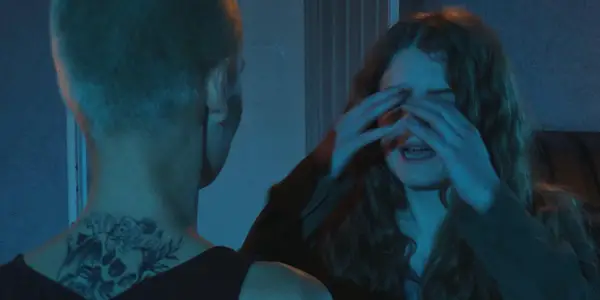
Have you ever found yourself liking a film, until you find yourself asking “wait. I think I’ve seen this before.” This was the unfortunate situation for DeadMe, from director Paul Hart-Wilden. There was definitely intrigue as DeadMe began, a posting with rip off numbers attached to a telephone pole. As Ash rips one for herself, texting “DeadMe” to the number listed, her world plummets into fear and anxiety, a choice of number revealing she has only 48 hours to live. “Thank you for Playing”.
There is a very Final Destination feel that immediately sets in, the inescapable feeling of death. As she makes her way to the safety of her home, a safety that is immediately stolen, a man begins to follow her, watching her – ready to complete what has been promised. As it continued, I found myself calling back to both Netflix’s Black Mirror and Quibi’s The Stranger, giving the film a knowledgeable feeling of the genre and the inspirations it clearly has called upon.
As it continues, bringing audiences to its epic and unresolved conclusion, the entirety of DeadMe feels like a proof of concept to via for a coveted spot in the Blumhouse collection of horror. And as DeadMe concludes, I find myself wanting more, a fun little horror I would love to see come to full fruition. That is until I realized I had heard this story before. Back in October 2019, a quiet horror release brought about Countdown, a film following a young nurse who downloads an app that gives users their supposed time of death. As she tries to escape the seemingly inescapable, she is followed by an unknown figure. Unfortunately for DeadMe, within this recall, it loses much of its pizazz it initially boasts.
Per Tutta La Vita (Roberto Catani)

Honestly, I am still scratching my head with this one. Placed within the horror shorts collection, there is a feeling of miscategorization, the short seemingly not a horror, fitting better with the international or animated short categories. The night’s second animated short, it is a spectacular display in animation, images flowing in and out of one another, displaying a connection between humans, inanimate objects, and the world around them.
There is a feeling of love that is all the more heightened by the score of French amor, though the horrors one would expect absent from the screen. When you read the synopsis, you are informed this is an abandoned acrobat lamenting a relationship lost and the love that was once shared. There is a horror in the recollection of what losing a loved one is like, as we have all experienced heartbreak throughout our life, yet the animation is bright and youthful, promising that even though two lives were once entwined, there will always be another.
Canal (Piers Hunt, Michael Jinks)

Canal, from directors Piers Hunt and Michael Jinks, is another intriguing short brought to audiences through the Psych Night collection. As a young woman makes her way through the darkened streets and under the cover of the bridges that transverse the canals, she catches a glimpse of a man following her. As she feels escape is not possible, she confronts the man, pushing him into the canal – only to discover he was just trying to return her phone he had seen her drop. Why he would not just yell out that she had dropped her phone? This is one of the many questions that will arise as you watch the short.
After she helps him out of the canal, the gentlemen finds himself once again in the thrust of distrust as the woman’s fiancée arrives, perceiving she is in trouble and punching him right in the face. As the misconstrued situation is straightened out, the couple invites the man to their home to dry his clothes, stating it is the least they can do. Yet, as the short will prove, you should always go with your gut.
Canal is a short that builds its suspense, attempting to calm its audience into a false sense of security as it builds its narrative. Much like our young couple, audiences will feel their gut telling them to run and hide – leading audiences to scream “no!” at the screen before them. Yet, the short takes to much time building that suspense, spending more time easing audiences, than digging deep the idea of the many faces of individuals. It also does not trust its audience to put the pieces together, making the final conclusion obvious long before it has arrived. It is an entertaining short, but one I had wished had been a bit more.
Unspoken (Alessandro Girolami)
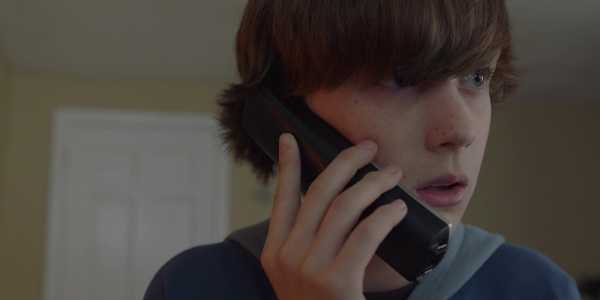
The night came roaring back to life in the eerie and heartbreaking short of Unspoken, from director Alessandro Girolami. As a young boy looks on at a couple, he feels he is not alone. Turning around, he is faced with a dark fog-shrouded figure. Immediately running home, we are reintroduced to the young boy as he sits solemnly on his bed, a picture in hand, his mother comfortably sitting beside him. Viewers immediately come to understand that for some undisclosed reason, the boy has gone mute, attempts by the parents and doctors unsuccessful.
As the mother leaves for work, the boy is left to face off against the shrouded figure once again, this time, its resilience more determined than in the woods. As he runs from the figure, determined to fight and make it out alive, the true nature of the boy’s silence is revealed, the identity of the figure heartbreakingly understood. At this moment, this is no longer quick horror short meant to entertain, but rather to inform.
As parents, the effect we have on our children is insurmountable. For the first several years of their lives, they will not only shape themselves around our words and actions, but they will also hold onto these interactions closely to their hearts. For this young boy, his father’s reaction to his discovery of adultery by his son causes a ripple effect of silence that only this young boy can undo. The damage through our actions that we could pass down to our children may stay with them, but it will also be their burden to handle as they maneuver through their futures.
Bottle Neck (Mans Berthas)
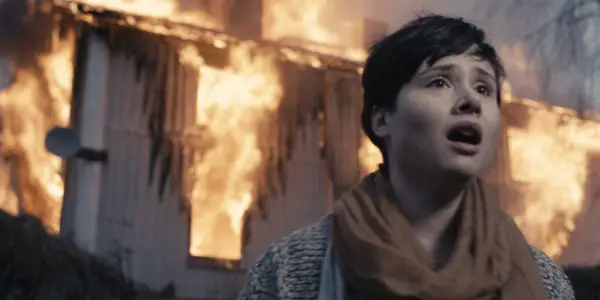
Vengeance has its successes and it has its failures. With Bottleneck, from director Mans Berthas, three young women who have been wronged in some way set out to enact vengeance on those who have hurt them. To decide who will be the one to deliver the revenge, they spin a bottle, a flash-forward showing one of the women running from the home she has clearly burned down. As they struggle to unanimously decide what to do next, an older woman walks into the room, shotgun in hand, ready to enact her own form of vengeance. In an act that brings the short full circle, she has the young women play one last game of spin the bottle.
There is an interesting contrast created by the simple act of spinning the bottle. As many of us will identify, spinning the bottle is an innocent game played by young teens as they begin to explore their sexuality – the bottle deciding who one will kiss. The random chance heightens the desire for those you truly want and the anxiety of who you might get. For Bottleneck, the innocence is lost, the luck of the draw tied to violence and anger.
Bottleneck is a quick short that gives little explanation, requiring an interpretation of nonverbal and facial expressions. A part of me wished it had been just a bit longer, given audiences a little more time to explore these characters and understand them – even if it was just for this one scene. And while that sounds like a critique, it is not. The desire for more speaks well to the short and the intrigue it is able to conjure.
Our Boy (Kyle Sims)
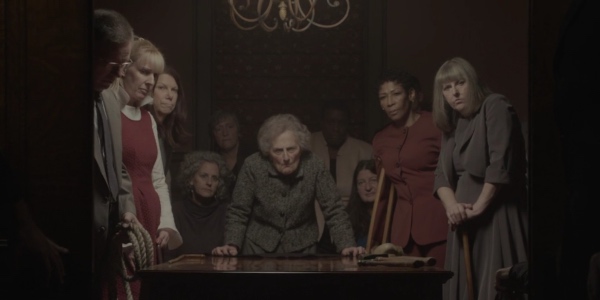
Unfortunately, this is the short I disliked the most throughout the entire collection. There is a lack of plausibility to its narrative that is hard to reconcile and there is to much left in the dark from audiences – to much unseen. While many times this would help a horror or a thriller thrive, for Our Boy, from director Kyle Sim, it is only draining of interest and patience. There is an annoyance derived from the lack of understanding a viewer is able to garner, as well as an increasing anxiety from the one note at a time scales that comprise its score.
The short was described as “On the eve of a boy’s adolescence, his community gathers to initiate a peculiar ceremony.” Peculiar, yes. It most definitely checks that box. But not always in a good way. Unfortunately, in the darkness of understanding that the film shrouds its viewers in, there is little to be taken away, and no horror to be felt.
Shift (Josh Armstrong)
Shift, from director Josh Armstrong, kicks off as a gentleman is about to start his nightly shift at an ice rink. And not just nightly but overnight. This is the film’s first problem – why would there need to be someone overnight at an ice rink? While there is already a question of believability, it does take viewers on an eerie and seemingly paranormal trip through the building. Skates fall to the ground repeatedly, doors open on their own and shadows lurk in the dark.
Where Shift starts to falter is in its structure and narrative. Warned not to go on the ice as it is dangerous, the man defies the warning. You know something is coming as soon as he walks on the ice, the jump scares becoming less effective – we as viewers know this is where the action will take place. Also, the camera holds too long on its central figure, audiences looking in the background for anything lingering, many times to their disappointment.
The man is also given very little believability to work with himself. As he sits on the ice in fear, he is paralyzed, myself wanting to yell at the screen to keep walking or to get up and run. It’s as though when the horror is presented before him, he instantly resolves himself to his fate – making empathy and hope for the character nonexistent.
Does content like this matter to you?
Become a Member and support film journalism. Unlock access to all of Film Inquiry`s great articles. Join a community of like-minded readers who are passionate about cinema - get access to our private members Network, give back to independent filmmakers, and more.













